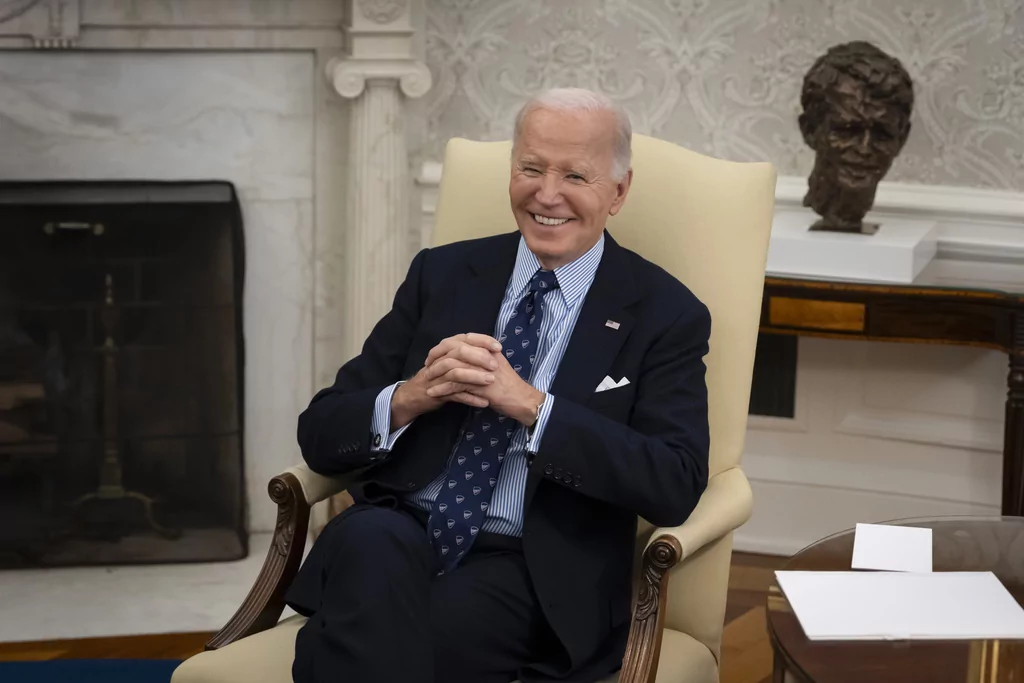
As the Senate’s lame-duck session begins, President Joe Biden and Senate Democrats are racing against the clock to confirm dozens of judicial nominees before Republicans take control of the Senate and President-elect Donald Trump assumes office in January.
During Trump’s first term, judicial appointments were a priority, resulting in the confirmation of 237 federal judges, 54 of whom were key appeals court nominees, in addition to three Supreme Court justices. Now, Senate Democrats are striving to match this record, with Biden having appointed 213 judges since taking office — trailing Trump’s first term total by only 23.

The Senate voted 51-44 on Tuesday to confirm April Perry as a judge for the U.S. District Court for the Northern District of Illinois. The Democratic-led Senate Judiciary Committee has scheduled votes Thursday on more Biden judicial nominees.
But it is unclear whether Democrats will be able to outdo Trump’s record of appointing 174 district court judges, the only category in which Biden could surpass Trump. Meanwhile, Trump has encouraged Republicans in recent days to take every measure available to stall Democrats from confirming any more judges before Biden’s exit.
“No Judges should be approved during this period of time because the Democrats are looking to ram through their Judges as the Republicans fight over Leadership. THIS IS NOT ACCEPTABLE,” Trump posted to Truth Social this weekend.
The push to confirm Biden’s picks has intensified amid concerns that the current 47 judicial vacancies, if left unfilled, could be filled by Trump conservative judges, cementing a rightward shift in the federal judiciary for years to come.
Trump will reenter the Oval Office next year with far fewer vacancies on the federal bench compared to his first term in 2017. But University of Richmond law professor Carl Tobias said there could be around three dozen judges on appeals courts who could take senior status under his second term in office. Presidents exert particular influence on the judiciary via appointees to appeals courts.
“I think to some extent, there’s a custom that judges try to step down in the administration of a president of the same party that appointed them, and there are three dozen or so Republican appointees on the appeals courts who could take senior status — they’re eligible now. And I think some of them may,” Tobias said.
Last month, the Brookings Institution’s governance studies expert Russell Wheeler declared in one of his routine reports on the judiciary that “Biden cannot match Trump’s 54 court of appeals appointments.”
Trump’s influence on the judiciary has notably moved many federal courts toward more conservative rulings, shaping outcomes on key issues from abortion rights to federal regulatory authority. There’s even been speculation that Trump could further cement the 6-3 Republican-appointed majority on the Supreme Court if Justices Samuel Alito or Clarence Thomas retire under his administration, though a source familiar with Alito’s plans told the Wall Street Journal Tuesday that he has no plans to retire under Trump.
Senate Democrats currently hold a narrow 51-49 majority, enabling them to confirm judges by simple majority if party members remain unified. However, unity is fragile.
Independent Sen. Joe Manchin (WV), who caucuses with the Democrats, has indicated he will only support nominees who gain some bipartisan backing, a factor that could hinder the rapid confirmation efforts.
Republicans, galvanized by Trump’s vocal calls to block all Biden judicial nominees, are likely to mount opposition during this critical period. Trump has called on GOP lawmakers to stand in opposition to “activist judges,” whom he argues are detrimental to the country.
Among the nominees awaiting confirmation is Adeel Mangi, who, if confirmed, would become the first Muslim American on a federal appeals court. Mangi’s nomination has faced opposition from both Republican senators and some Democrats, who question his associations with certain civil rights advocacy groups.
Nevertheless, Biden’s allies, including Senate Judiciary Chairman Dick Durbin (D-IL), are determined to proceed. Durbin’s spokesperson indicated that the goal is to confirm “every possible nominee before the end of this Congress.”
In addition to Mangi, 15 nominees await floor votes, and 11 others are still being processed by the Judiciary Committee. Senate Majority Leader Chuck Schumer (D-NY) has said that the chamber will advance “as many as we can” during the remaining days of the current Congress. However, other legislative priorities, such as passing a spending bill to avoid a government shutdown, may limit available floor time for judicial confirmations.
Biden’s judicial appointments have marked a significant diversification of the federal bench. His appointees include an unprecedented number of women, minorities, and gay individuals, reflecting a contrast to the largely white and conservative makeup of Trump’s appointees. The president also appointed Justice Ketanji Brown Jackson in 2022, making her the first black woman on the Supreme Court.
Trump, who plans to continue focusing on the judiciary, could replace Biden’s unconfirmed nominees with judges who align with his conservative vision. His previous appointees have played pivotal roles in Supreme Court rulings that have reshaped fundamental areas of American law, including the Court’s recent decisions restricting race-conscious admissions and expanding gun rights.
Trump allies have also floated the possibility of elevating judges such as U.S. District Judge Aileen Cannon, who dismissed his recent federal indictment, for promotion to higher courts.
With uncertainty over whether Biden can top Trump’s 237 judges, Democrats are focusing on incremental wins to chip away at the number of vacancies Trump could fill.
Thomas Jipping, a senior legal fellow at the conservative Heritage Foundation, wrote in an op-ed on Wednesday that the 119th Congress is on track to match the end of 2020.
“Beating Trump’s first term judicial appointment total would be one of Democrats’ final swipes before they relinquish Senate control,” Jipping wrote while noting that, under Trump, Democrats opposed 41% of the then-president’s nominees.
“That trend has continued, with the average Republican voting against 78% of Biden’s nominations,” Jipping added.
Tobias said that Democrats could still confirm many of the candidates who have advanced out of committee unless Republicans undertake measures to stall the process.
On Thursday, Democrats have listed six nominees to advance to the Senate for the vote, but Tobias said he believes the “GOP will ask to hold them over for a week,” a move that could jeopardize Biden’s ability to match Trump’s total.
CLICK HERE TO READ MORE FROM THE WASHINGTON EXAMINER
Former President Jimmy Carter maintains the record for the most judges confirmed in a single term, notching 258.
If Biden manages to confirm all 26 nominees in the pipeline, he would surpass Trump’s first term total by securing a record-breaking number of confirmations, a high-stakes goal, given the current partisan dynamics.






